#why is someone who speaks german or french seen as more of an intellectual than me even though we both went through the same journey?
Text
here's a friendly reminder that if english is your second language it's not "to be expected" or "the bare minimum"; it's actually so impressive and so much work to learn another language, let yourself be proud of it
#i don't see this attitude with any other language; only english#why is someone who speaks german or french seen as more of an intellectual than me even though we both went through the same journey?#learning another language is difficult and shouldn't be something we just expect of people just bc it's such a widespread language#notice how one of the first phrases you learn in a foreign language is 'do you speak english' even when english isn't your first language#it really makes you think
106 notes
·
View notes
Text
A Little Princess - Chapter 3
“On that first morning, when Sara sat at Miss Minchin's side, aware that the whole schoolroom was devoting itself to observing her, she had noticed very soon one little girl, about her own age, who looked at her very hard with a pair of light, rather dull, blue eyes. She was a fat child who did not look as if she were in the least clever, but she had a good-naturedly pouting mouth.”
Why is fatness always associated with not being clever in children’s books? The only exception I am familiar with is Piggy from Lord of the Flies.
And of course we see here something we see a lot in older children’s novels. Someone’s character being obvious from the face they make or their features.
“Upon which Miss St. John gave another jump, and when Lavinia and Jessie tittered she became redder than ever—so red, indeed, that she almost looked as if tears were coming into her poor, dull, childish eyes; and Sara saw her and was so sorry for her that she began rather to like her and want to be her friend. It was a way of hers always to want to spring into any fray in which someone was made uncomfortable or unhappy.
"If Sara had been a boy and lived a few centuries ago," her father used to say, "she would have gone about the country with her sword drawn, rescuing and defending everyone in distress. She always wants to fight when she sees people in trouble."”
And here we have the first instance of Sara being a truly idealized character. So far she has only been odd and intelligent and unnecessarily polite which only added to her weirdness. But starting with this instance she is portrayed as a fairly heroic idealized character, I will admit to that. But I am not too troubled with this, because she is still an original character with a particular personality and not the cardboard cutout of how the author thinks little girls should behave.
“So she took rather a fancy to fat, slow, little Miss St. John, and kept glancing toward her through the morning. She saw that lessons were no easy matter to her, and that there was no danger of her ever being spoiled by being treated as a show pupil. Her French lesson was a pathetic thing. Her pronunciation made even Monsieur Dufarge smile in spite of himself, and Lavinia and Jessie and the more fortunate girls either giggled or looked at her in wondering disdain. But Sara did not laugh. She tried to look as if she did not hear when Miss St. John called "le bon pain," "lee bong pang." She had a fine, hot little temper of her own, and it made her feel rather savage when she heard the titters and saw the poor, stupid, distressed child's face.
"It isn't funny, really," she said between her teeth, as she bent over her book. "They ought not to laugh."”
The book, having been published in 1905, hits you over the head with how “stupid” Ermengarde is. I remembered her as exceptionally stupid, though this might have something to do with her later naïveté in not understanding Sara’s new condition. Based on this chapter alone, she isn’t “stupid”, she is just a seven-year-old who is not particularly academically talented and has anxiety because of the expectations of her father.
We again see Sara’s heroic streak.
“When lessons were over and the pupils gathered together in groups to talk, Sara looked for Miss St. John, and finding her bundled rather disconsolately in a window-seat, she walked over to her and spoke. She only said the kind of thing little girls always say to each other by way of beginning an acquaintance, but there was something friendly about Sara, and people always felt it.
"What is your name?" she said.”
I really like how randomly children can become friends.
How friendly Sara is is something that is always recognized by others. Is this the same Sara that thought she didn’t care much for other little girls and was only interested in her books in Chapter 1? Perhaps by “friendliness”, it means “goodness” and “kindness”, after all in this chapter Sara befriends Ermengarde partially because she pities her, not really because she is desperate for a friend.
“To explain Miss St. John's amazement one must recall that a new pupil is, for a short time, a somewhat uncertain thing; and of this new pupil the entire school had talked the night before until it fell asleep quite exhausted by excitement and contradictory stories. A new pupil with a carriage and a pony and a maid, and a voyage from India to discuss, was not an ordinary acquaintance.”
Sara being defined by her riches is important, because the story is about whether she can stay polite and a “princess” when she loses all of it.
“"My name's Ermengarde St. John," she answered.
"Mine is Sara Crewe," said Sara. "Yours is very pretty. It sounds like a story book."
"Do you like it?" fluttered Ermengarde. "I—I like yours."
Miss St. John's chief trouble in life was that she had a clever father. Sometimes this seemed to her a dreadful calamity. If you have a father who knows everything, who speaks seven or eight languages, and has thousands of volumes which he has apparently learned by heart, he frequently expects you to be familiar with the contents of your lesson books at least; and it is not improbable that he will feel you ought to be able to remember a few incidents of history and to write a French exercise. Ermengarde was a severe trial to Mr. St. John. He could not understand how a child of his could be a notably and unmistakably dull creature who never shone in anything.
"Good heavens!" he had said more than once, as he stared at her, "there are times when I think she is as stupid as her Aunt Eliza!"
If her Aunt Eliza had been slow to learn and quick to forget a thing entirely when she had learned it, Ermengarde was strikingly like her. She was the monumental dunce of the school, and it could not be denied.
"She must be MADE to learn," her father said to Miss Minchin.”
Ermengarde’s father is well characterized. He is an intellectual who picked a pretentious ancient Germanic name for his daughter; one which the similarly bookish Sara is charmed by. He is openly insulting to his daughter and his sister/sister-in-law. His high hopes for his daughter and insisting her to be what she isn’t probably contributes to Ermengarde’s anxiety in the classroom. She is seven years old and he is already disappointed in her. He is a jerk.
“"You can speak French, can't you?" she said respectfully.
Sara got on to the window-seat, which was a big, deep one, and, tucking up her feet, sat with her hands clasped round her knees.
"I can speak it because I have heard it all my life," she answered. "You could speak it if you had always heard it."
"Oh, no, I couldn't," said Ermengarde. "I NEVER could speak it!"
"Why?" inquired Sara, curiously.”
I like that Sara knows French so well not because she is a super-genius but because she was raised bilingual.
(Sara is talking about why she was given her own sitting room). “”Yes," Sara answered. "Papa asked Miss Minchin to let me have one, because—well, it was because when I play I make up stories and tell them to myself, and I don't like people to hear me. It spoils it if I think people listen."”
I relate to Sara here.
"Oh, she got back to her seat before we could see her!" Sara explained. "Of course they always do. They are as quick as lightning."
Ermengarde looked from her to the doll and back again.
"Can she—walk?" she asked breathlessly.
"Yes," answered Sara. "At least I believe she can. At least I PRETEND I believe she can. And that makes it seem as if it were true. Have you never pretended things?"
"No," said Ermengarde. "Never. I—tell me about it."”
Ermengarde is amazed by what Sara is doing, but what she is doing is an ability which is on some level common to all children and which we unfortunately mostly lose as we grow up: That is the ability to play pretend knowing that it is pretend and still get absorbed in it without needing to tell anyone about it. Actually on some level Sara is less childish about her game of pretend than most children are, she clearly feels the need to tell others about it as if she is a storyteller rather than a little girl simply playing, and she actually is a storyteller. Her daydreams and games aren’t simply left as just that, they are also recounted.
“She was so bewitched by this odd, new companion that she actually stared at Sara instead of at Emily—notwithstanding that Emily was the most attractive doll person she had ever seen.”
I have lost the count of how many times Sara is described as “odd” or “queer”.
I like that Ermengarde calls Emily “doll person”.
“Sara sat upon the hearth-rug and told her strange things. She sat rather huddled up, and her green eyes shone and her cheeks flushed. She told stories of the voyage, and stories of India; but what fascinated Ermengarde the most was her fancy about the dolls who walked and talked, and who could do anything they chose when the human beings were out of the room, but who must keep their powers a secret and so flew back to their places "like lightning" when people returned to the room.”
Ermengarde is fascinated because she didn’t grow up with Toy Story.
(Sara and Ermengarde are talking about Sara’s father and how she misses him) “I love mine more than all the world ten times over," Sara said. "That is what my pain is. He has gone away."
She put her head quietly down on her little, huddled-up knees, and sat very still for a few minutes.
"She's going to cry out loud," thought Ermengarde, fearfully.
But she did not. Her short, black locks tumbled about her ears, and she sat still. Then she spoke without lifting her head.
"I promised him I would bear it," she said. "And I will. You have to bear things. Think what soldiers bear! Papa is a soldier. If there was a war he would have to bear marching and thirstiness and, perhaps, deep wounds. And he would never say a word—not one word."
This is clearly foreshadowing of how Sara will behave when faced with serious hardship.
“Presently, she lifted her face and shook back her black locks, with a queer little smile.
"If I go on talking and talking," she said, "and telling you things about pretending, I shall bear it better. You don't forget, but you bear it better."
This again foreshows how Sara will survive through the novel.
“Ermengarde did not know why a lump came into her throat and her eyes felt as if tears were in them.
"Lavinia and Jessie are 'best friends,'" she said rather huskily. "I wish we could be 'best friends.' Would you have me for yours? You're clever, and I'm the stupidest child in the school, but I—oh, I do so like you!"
"I'm glad of that," said Sara. "It makes you thankful when you are liked. Yes. We will be friends. And I'll tell you what"—a sudden gleam lighting her face—"I can help you with your French lessons."”
I love how as children you can be frank about wanting to be someone’s best friend.
*This book is too fun to make it into homework so I am not going to continue with these chapter by chapter posts. I will write a post about it if I have anything particular to say, but I am not going to do separate posts on chapters. I will definitely write a retrospective and my final thoughts when I finish the audiobook though.
6 notes
·
View notes
Photo

Translated interview
Adèle Haenel: 'Sex in cinema is usually quite pathetic’
Wenke Husmann, in: Die Zeit, 31st of October 2019
Additions or clarifications for translating purposes are denoted as [T: …]
Our understanding of art? Patriarchal! Eroticism in cinema? Stunted! The actress Adèle Haenel about her new film ‘Portrait of a Lady on Fire’.
In the film ‘Portrait of a Lady on Fire’, the young aristocrat Héloïse literally catches fire. Around 1770 she falls in love with a young painter, who is supposed to portray her. The role of the shy former convent student seems unusual for Haenel at first glance, who otherwise plays very assertive female characters: an AIDS activist in ‘120 BPM’, a martial artist in ‘Love at First Fight’, a doctor who solves a murder in ‘The Unknown Girl’. But Haenel also interprets the role of the muse as a very active one. The actress had her breakthrough in 2007 at the age of 18 with ‘Water Lilies’, the debut film by film-maker Céline Sciamma. The two were a couple for years. ‘Portrait of a Lady on Fire’ is their second collaboration, which was awarded the Best Screenplay (for Sciamma) at the Cannes Film Festival.
Haenel speaks German very well. She learned the language almost perfectly for Chris Kraus' feature film ‘The Bloom of Yesterday’. However, whenever she speaks German, she will always be so categorical, Haenel warns, and after a very German expletive slips into the conversation, she switches to French.
ZEIT ONLINE: In ‘Portrait of a Lady on Fire’ you play a restrained woman at first. Your Héloïse is supposed to be portrayed by a painter. She is the more experienced, a self-assured artist you fall in love with. But then you reinterpret the role of the muse.
[T: Short bio of Adèle and description of the film is inserted here, but I didn’t translate these, as y’all know everything already 😏]
Adèle Haenel: It's about equality. I believe that the role of the muse is in fact active - and as important as the official role of the artist.
ZE: What is the active part or equality in the relationship between you being the portrayed and the painter? And what's new about it?
AH: I think in art history, being a muse was the role that women were allowed to play. That's why men said, ‘Oh, it's a passive role, the muses are just in the room, and we're dreaming and fabricating great ideas in our heads.’ It was their way of saying that as men, they are the only ones who create art. That's Scheiße [T: 💩 💩 💩] in my opinion. I’m sorry. Whenever I speak German, I am always a bit more categorical. But that’s the way it is.
(Continues the conversation in French)
I believe, however, that muses have always been active. They were just not presented like that. This also has a lot to do with a certain notion of art. Art is not just an ideal sphere that comes down to earth through an artist who is both absolute and ingenious. Art is created by questioning your own choices over and over again, as well as the reasons that led to them. Thus, there is something sacred and something entirely unholy in art. Questioning postulates, constantly questioning your own work, makes art powerful. And that is much more the result of collaboration than of anything else.
ZE: In this case, collaboration is based on love. Muse and artist are on equal terms. Your connection acts like an engine and unleashes the creativity of the artist. Is that the reason why the first portrait that the painter Marianne made of you as Héloïse is technically good but rather conventional? [T: the interviewer uses ‘not befitting’ here]
AH: It's not even about the progression, where only love makes art better, but it’s actually about the process. That's why you constantly ask yourself questions. Of course, at some point a portrait will come out, but in the film it’s not about whether that’s a good thing or not in the end. The problem of the first ‘failed’ portrait is that it avoids any questions. It does not ask exactly: Who is this person? What attitude did the painter take towards her? Does the model have an essence that we try to capture and bring to the canvas? Or is it just about capturing a specific moment? At this point, the collaboration begins. My character Héloïse begins to question Marianne, the artist, ‘What's that supposed to be?’ And when Marianne answers, ‘That's the way to do it,’ Héloïse retorts, ‘What do you mean, that's the way it is done, how do you find yourself in it, what's your attitude towards it?’ And you cannot just take that stance, you have to feel it.
ZE: Is this relationship comparable to what you have as an actress with the director Céline Sciamma?
[T: The above was taken from a translation on the Teller Report website and revised where necessary, my own translation continues below.]
AH: Yes, absolutely. Our collaboration is based on that idea. There are also parallels in terms of content, because painting in this film also has a lot to do with cinema. As it’s also about sequence, scene and so on. The screenplay was very detailed. Improvisation as a method wasn’t intended. But I had a certain amount of freedom to shape my character. The point wasn’t to do this behind closed doors, but the idea was developed in exchange to centre my character around the gaze and into three phases: At the beginning of my journey, I saw myself more as an object, then there was the phase of questioning, and at the end I’m more of a subject. This means that I used my face like a mask at the beginning of the film, very solemn, almost sacral, with little emotion, reserved. The warmer Marianne’s gaze becomes at Héloïse, the more I change the way I’m acting. I become more active and animated. I gave myself a very clear structure. Céline went with this kind of idea. And then we start to discuss about specific and precise things.
ZE: That seems quite practical and unpretentious.
AH: Oh, I’m a very impatient person and get annoyed very quickly. That’s why I can’t stand some of the questions that I get (mimics a stupid tone): ‘How do you endure just being looked at the whole time?’ I do retort then: ‘Have you even seen the film? It’s about the exchange of gazes!’
ZE: There is a narrative framework in the film, where Marianne remembers this love several years later. It’s about the impact of that encounter. How important is such an echo for the arts?
AH: You could say that every human being contains something like an eternal truth inside of them, but that this cannot manifest in a person in its pure form. The potential is there. So, you can develop, change, grow. It’s almost our responsibility to become a better [T: bigger is stated here] person, who exhausts all possibilities to become what makes us human. A romantic relationship [T: love affair…] also makes us feel the possibility to become someone else, more than what we were before. I’m thinking in particular of Spinoza in this context.
ZE: In short, he talks about the necessity of individuals to evolve so that they become more perfect. [T: ‘Vollkommenheit’ is difficult to translate, but I understand that Spinoza meant that this is the ideal state of being, see: The Ethics, Part 4. Of Human Bondage, Or The Strength Of The Emotions, Preface]. Looking at your career, it seems that you and film-maker Céline Sciamma, who was your partner for a long time, also helped each other very much in that sense to evolve.
AH: Céline and I have an extremely close connection and always had an intense intellectual exchange with each other. And an intense emotional exchange, but of course that changes over time. When it comes to what I said before about the search for and questioning of what’s underneath, and how we make choices in terms of our work, then Céline and I understand each other well. We agree about the questions and how we can communicate about them.
ZE: The film takes place around 1770. Back then, the first female artists’ associations were found such as the school of Adélaïde Labille-Guiard. Marianne also worked in such an art school. It was only a few years that women could work as painters. Before and after, female artists could only do that in a limited capacity. Why was that?
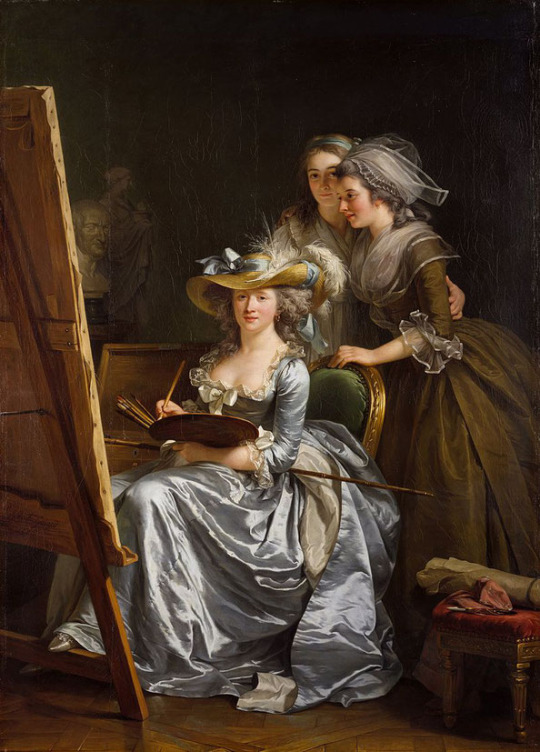
Adélaïde Labille-Guiard, Autoportrait avec deux élèves (1785) © Metropolitan Museum of Art, New York
AH: You get the impression that the female gaze is somehow threatening for male colleagues, that’s why they always tried to ban it. And besides, that is still the case.
ZE: How?
AH: Because some kind of natural order is being postulated. We have very much internalised this patriarchal order, in our intimacy, our desires, in everything. Indeed, challenging this perceived natural order is dangerous, because the entire patriarchy virtually depends on this everywhere. The trick to avoid answering questions that women are asking is in pretending that women really don’t have any reason to ask these kind of questions: They are doing well after all. If it wasn’t that pathetic, it would be really funny.
[T: Two of the below bits were extracted (for ease of reading) from @hedawolf‘s fantastic gifset on Adèle smashing the patriarchy, please head over and show some love.]
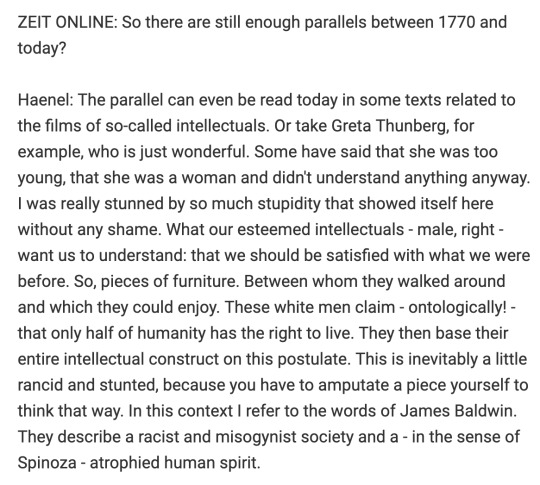
ZE: It seems that many big film festivals are now more open to show films that are about interesting and diverse female characters. Aren’t there more of these stories these days?
AH: Indeed, the problem has now come to the surface of society – two years after the Weinstein affair and #MeToo. You can see the facts. These are hilariously pathetic: 100 per cent of women, who use public transport in Paris, have experienced violence or abuse. 100 per cent! You always hear: ‘No, not all men are like that.’ Yes, of course. But all women have experienced this. And men also feel it. They’ve started to question the structures, in which this was possible, and in which they also lived for a long time. They also question their own behaviour. It’s not about locking up all men in a cage, but that we all evolve. It will make us all freer. But you have to let go of your little privilege of always being in charge. I understand that this is tough. [T: 😏]
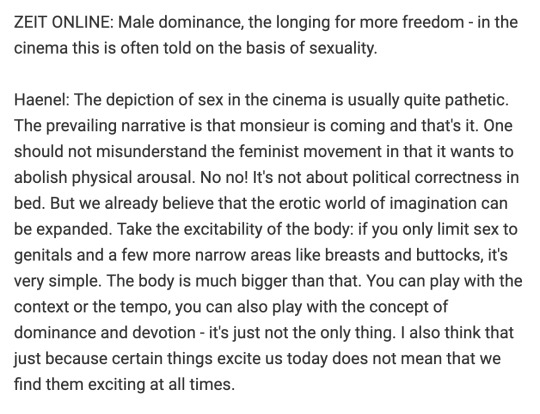
ZE: You’ve really shown us one of the most wonderful scenes on this topic in your film, without men.
AH: This scene is sexy, inventive, created in collaboration – we were also quite satisfied with it. That’s why I was so happy at the premiere in Cannes: There are 2,000 people in the audience, who will see something completely different.
#Die Zeit#October 2019#German interview#NGL this was tough to translate#But would I do it again#YES#Adèle Haenel#was not amused in this interview#about male privilege#and worse#Portrait of a Lady on Fire#Céline x Adèle#for life#Relationship goals#Intellectual and emotional#My translation#long post
169 notes
·
View notes
Note
#4 for Lanzo, 8 for Q, 16 for Niner, 18 for Nate, 19 for Connie, 25 for Ian, 35 for Susanna, 36 for Kira, 38 for Amanda, 45 for Darcy, and 50 for Lauren; if you please, and thank you! :)
I hope you don’t mind, but since two of these questions were already answered, i’ve swapped them with different ones.
4. Lanzo's favorite season?
Answered here.
Alternate question, what languages does he speak?
Lanzo’s native language is medieval German. He learned Latin in his youth, picked up French when he moved to France, and more than a few words of other European languages in the periods in-between leaving his manor in Germany and moving to France, and leaving France and moving to the United States.
There have been enough centuries between those days and now that he’d need to pause to think if asked for a word or phrase in one of those languages, but once he gets into the swing of it, he’s as fluent in French and German as he is in English. He almost never speaks either of them, but on occasion he’ll pick up a book or watch an undubbed foreign film in its original language.
8. What is Q's clothing style?
Jacket, t-shirt, jeans, tennis shoes. That’s pretty much it.
He wears the same jacket, and all of his t-shirts are band name t-shirts, whether or not he’s listened to or even heard of the band in question. A notable percentage of the bands are foreign, courtesy of his rich cousin who sometimes struggles with the concept that other people don’t import their food/clothes/furniture/etc. from other countries at a whim.
16. Niner's favorite comfort food?
Cheese. She won’t touch American cheese (and who can blame her), but any other kind of cheese, in any form, especially if it’s hot. If she’s in a particularly bad mood, she’s been known to spread cheese on a baking sheet and heat it in the oven until it starts melting.
18. Nate's music taste?
I can kind of feel the answer here, but finding the accurate terms is difficult.
Pop rock/punk -- Panic! At the Disco, Fall Out Boy, Green Day, Blink-182, Owl City, bands like that. Some synth, some electric, but not the full-blown artificial sound of techno or electronica. His favorite songs tend to be less loud and angry, and more sad and emotional.
He visits a lot of music sites to find new indie groups, too, mostly to find artists with more ingenuity or talent than tend to end up on Billboard’s Top 40. Not that he doesn’t like the sound of a good acoustic guitar well-played, but it means more intellectually than emotionally.
19. Is there a story behind Connie's name/meaning?
His full name is Conrí Rhys Lowell. Conrí is Irish, meaning “wolf king”. Rhys is Welsh, “enthusiasm”. Lowell is English, adapted from a French nickname meaning “wolf”.
It’s rare for a werewolf family to have a last name that doesn’t connect back to wolves somehow, or at least apply to wolves (Gray, Hunter, etc.). In most cases, giving your child a first or middle name that also refers to wolves or dogs is seen as poor taste, certainly leaving the poor kid open to lots of teasing. But clan leaders like Connie’s parents tend to use many of the same names that their families have been using for generations, some of which can be a bit on the nose. In Connie’s case, his parents were looking for old family names connected with royalty and leadership for their last litter, and liked the sound of Conrí. The “wolf” part was a bit inconvenient, like your child having a similar name to someone infamous or their initials forming something stupid, but not bad enough to put them off the name.
25. Does Ian have any allergies?
He’s not allergic to any animals, but that’s the only exception. Technically he’s not allergic to food either (‘intolerant’ is the better term), but his stomach doesn’t like fish or dairy, though he still eats the latter. But whatever the season, something in Nature seems to be gunning for him. Fall is the worst -- there are days he walks around so stuffed up he can’t taste or smell anything.
35. Does Susanna like musicals?
Nope. Partly because Kira loves musicals, and as an Official Annoying Younger Sibling™, Susanna feels obligated to dislike them, but also because they’re so unrealistic. Not because of the singing, but the plots of some musicals just seem to go from one incredibly unlikely situation to another with hardly anything connecting them. There’s also this tendency for characters to sing about stuff instead of doing something about it.
36. Does Kira like marmite?
I’ve never had marmite, so i can’t comment on my characters’ opinions of it.
38. Does Amanda believe in the supernatural?
In her junior and senior years of high school, Amanda was looking to develop her investigative skills and also for ways to defy her overly strict mother -- staying out past curfew, hanging out in the more dangerous parts of town, and trespassing on private property was a way to do both. (Incidentally, this is when she interviewed the drug kingpin mentioned here.) She had no particular interest in the supernatural, but some of her friends were believers, and as a thrill-seeking teenager with an underdeveloped ability to make good judgement calls, more than a few of the things she investigated were supposed hauntings, ghost sightings, aliens, etc.
She never saw anything explicitly supernatural, but some of the places had an atmosphere she couldn’t shake, and more than once there were odd coincidences or unlikely occurrences. By the time she moved on to college, Amanda was not a believer, but less of a skeptic than she had been.
45. Does Darcy consider himself popular?
No, especially not after moving.
He was reasonably well-known and well-liked back at his old elementary school, where he’d spent enough time around the same people that he felt comfortable with them. He still wouldn’t have said he was popular, but he did have a reputation as one of the smartest kids in school.
50. Is Lauren good at remembering significant dates? Anniversaries, birthdays, etc.?
Answered here.
Alternate question, what is her favorite thing to do after a breakup?
Roller-skating.
The first time she had a break-up, she was in high school. Looking back, the relationship had been a bad idea to begin with -- they were both fifteen, he was new in town and to the school, she had even less grip on her temper than she would as an adult, about all they had in common was attending the same church and siblings on the same sports team -- and it had ended very badly, with a lot of harsh words on both sides. Though Lauren refused to admit it, a lot of what her ex-boyfriend had said about her hurt her deeply, and had her doubting her ability to have friends, let alone find romantic love someday.
One of her friends was having her birthday party at a local roller rink, and Ian half-convinced, half-pushed her into attending with him. It was a small, low-key group, and they were all very happy she came, and the one time the ex came up, they all agreed that he was a jerk who didn’t deserve her. It came as close to fixing her emotions as a single event could.
Her second break-up was in college. It didn’t end as badly, but they didn’t stay friends, and in the immediate aftermath Lauren missed a few classes because she refused to leave her dorm. When her roommate reached out in frustration to Ian, he came and dragged her out to the first roller rink he could find.
She complained that he couldn’t expect her to go rollerskating after every single break-up, to which he grinned and asked why not.
Lauren hasn’t had a relationship since that one, but if she ever has to break up with someone again, roller-skating is probably a given.
Thanks for asking!
#ask#answer#OCs#lanzo ramsey#q free#niner#connie lowell#ian grayson#susanna raines#kira raines#darcy raines#lauren winston#valiantarcher
2 notes
·
View notes
Text
In defense of The Shape of Water (I can’t believe I have to post this...)
At first I thought I was looking at the occasional troll posts from people who just wanted to get a rise out of Shape of Water fans but as the complaints became more and more plentiful I started to wonder were they really trolls or people who just got the wrong idea from some poorly written articles about the content of the film? Perhaps people who couldn’t follow the sign language portion of the movie for whatever reason?

Warning: This post does contain spoilers and might contain some controversial content.
Okay, here we go...
Item one: Elisa did NOT take sexual advantage of a “helpless” creature.
This is somehow more stupid to me than the claims that Beauty and The Beast is stockholm Syndrome- which I also consider to be exceptionally stupid.
The complaint I’ve been seeing most is the one claiming Elisa “took advantage” of a “Poor, simple” or “Vulnerable” creature.
1. The Creature was learning sign language, very, very rapidly. He actually figured out that her hand motions were language impressively fast considering that no one else around him communicated that way.

He learned the word “Egg” within moments of meeting Elisa and was soon able to form full sentences in sign language. He learned sign language it faster than most adult human beings, proving he is actually highly intelligent- possibly of genius level intellect- either that or he’s subtly psychic / telepathic, which is not outside the realm of possibility. Though many wince at the comparison I have to make it here. He’s pretty much just a non-verbal Abe Sapien from Hellboy and Abe was an intellectual.

It’s actually quite ableist to dismiss or diminish a being’s intelligence just because he does not communicate vocally. Isn’t that what the antagonists often did to Elisa? Constantly underestimate her and judged by appearances?
2. Elisa did NOT “Rape” the creature. This is a hideous thing to play “Boy who cried wolf” with and I am frankly disgusted to see this claim floating around. You want to see a real example of a male victim of rape: I present Jamie from Outlander as an example of a victim of repeated forced sexual acts from a male and later a female character. One by physical force, the other by threat and coercion.

There are even warnings on some episodes of Outlander because it addresses the very serious trauma of male rape.
There is no rape in The Shape of Water. Elisa asked The Creature in sign language if he wanted to be with her. He gave her an affirmative response.

Not only that but his masculine anatomy is retractable. Later Elisa describes this to her friend, Zelda. His organ doesn’t just respond to physical stimulation, it can be hidden and “secured” by will. Also he has very powerful claws that very easily tore a man’s throat open toward the end of the film.

Not only is he physically capable of preventing unwanted sexual actions the scene in question involved a literal request for consent and an affirmative response. In fact, later he asks for her and him to be “Together” again via sign language.
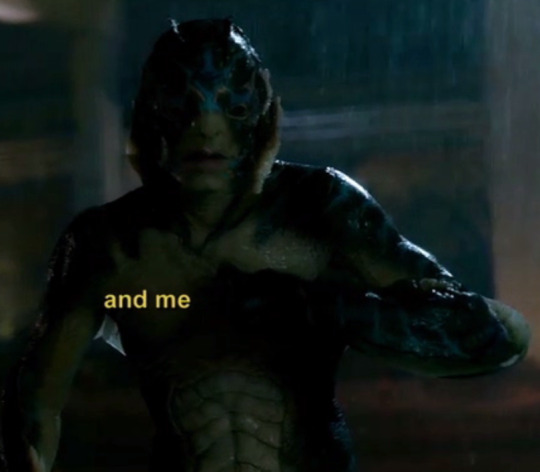
3. No, the film does NOT promote beastiality.
_____
According to the dictionary:
bestiality bes·ti·al·i·ty (běs'chē-āl'ĭ-tē, bēs'-) n. The quality or condition of being an animal or like an animal. Conduct or an action marked by depravity or brutality. Sexual relations between a human and an animal.
_____
The Creature in The Shape of Water does not behave like an animal. Nor does he look like any real-world lesser lifeform. Intellectually he has human intelligence or above that. To call Elisa’s relationship with The Creature Beastiality you might as well claim a man who is attracted to a short, small chested woman, must be a pedophile even if she’s a consenting adult and his intellectual equal.
There is a terrible argument being presented about the film, claiming that some primates can be taught sign language too but that doesn’t make them human or human level intelligence. This is true however The Creature in this movie learned sign language faster than most humans. It takes years to teach primates sign language and even then their conversations are very simple and rarely progress past kindergarten level communication. The Creature in The Shape of Water was learning improbably fast, forming sign language sentences in days. And he figured out that her hand gestures were a form of language even though no one else communicated that way. That takes intelligence beyond that of a chimp or even most human beings who aren’t familiar with sign language. I would argue that not only does he have human intelligence it’s likely above human intelligence.
The claim that because someone is unable to speak out loud they must be simple minded is a cruel argument that has been harmful to mute people for centuries.
It’s the view that mute people are seen as simple minded that is part of why cutting out someone’s tongue used to be a popular way to punish people who spoke out against those who were in power, whether politically or religiously. It was done because even if the victim found new ways to communicate they would be perceived (by many) as being simple minded because people associated not being able to speak with being dim witted. And unfortunately there are still people who think this way.
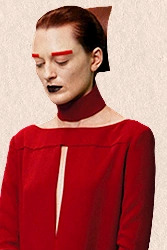
The subject even comes up with the mute slave class of the Avox in The Hunger Games, all punished political prisoners who have been rendered mute to prevent them from spreading their ideas. And even if they try to communicate who would pay attention to them now? It’s a form of culturally accepted ableism that unfortunately has existed in the real world for centuries and as detractors of the Shape of Water have proven, still exists today.
The word dumb even used to mean mute or unable to speak, hence the phrase “Deaf and dumb” or “dumbstruck.” It’s because being unable to speak had been associated with being simple minded that the modern version of the word dumb (to mean stupid) was able to take hold and thankfully we almost never hear it used anymore to mean mute. It is a disgusting and ableist argument.
Let’s use the Frankenstein Monster as an example of this. In Mary Shelley’s original novel when The Frankenstein Monster learned how to speak (within less than a year of him being created) he quickly picked up on German, French and English. He was extremely articulate and eloquent. he was even very old fashioned in his way of wording things. Even by early nineteenth century standards he was old fashioned. He even had a favorite work of literature that he often quoted, John Milton’s Paradise Lost.

However thanks to the Boris Karloff film everyone thinks of the Frankenstein Monster as simple minded and it’s not even really the Karloff film’s fault.
There’s something very wrong with that conceit- that Karloff’s version of The Frankenstein Monster is simple minded. If you watch the original 1931 Boris Karloff Frankenstein movie and Bride of Frankenstein you realize that the Frankenstein Monster, who technically should be at infant level, intellectual development (since he was just brought to life), learned to say things like “We belong dead” in a few months.
Now just imagine a three month old baby saying that. The baby would be seen as a hyper genius. Seriously depressed but a hyper genius. And yet because The Frankenstein Monster has an adult body (despite only being a few months old himself) people have repeatedly treated him as dim witted in parodies and even other film adaptations and sequels even though The Frankenstein Monster was supposed to be extremely intelligent and if you pay attention even the Karloff version was extremely intelligent with how fast he was learning. The simple fact that he started off as mute has caused this stereotype that The Frankenstein Monster is simple minded even though he is not dim witted at all.

Even Anne Rice is guilty of this with her own characters. She had a set of twins in her Vampire Chronicles, Mekare and Maharet. Maharet is a vampire who was blinded. Mekare was made mute. Maharet’s eyes were torn out and Mekare’s tongue was cut out to make her unable to speak. And yet Anne Rice had it that Maharet (the blinded twin) was intellectually perfectly fine. She even eventually gained sight through scientific means.

And yet poor Mekare was treated as simple minded by Anne Rice’s first person perspective narration from The Vampire Lestat and I don’t think it was just the character’s own bigotry. The characters of Maharet and Mekare were twins and before their mutilations Mekare was the leader of the pair, the more out-spoken. Her mutilation, and what she emotionally suffered after that, should not have diminished that aspect of her personality or rendered her simple minded. And yet Anne Rice, herself, repeatedly treated the character as animal-like because she could not talk. Mekare may have suffered more but there’s no reason her intelligence should have dropped off just because she was unable to talk and yet she was treated this way repeatedly by the protagonist and author.
Too many people associate ability to speak with being simple minded and do not even realized how ableist that truly is. They seem to do it unconsciously.
Those who paid attention to The Shape of Water realize the movie contradicted those old and misguided beliefs and misconceptions about beings that can’t talk out loud.
4. There are plenty of stories where a deity or mythological figure is unable to speak vocal human languages and I don’t just mean in Hans Christian Andersen’s the Little Mermaid.
Date with an Angel (1980s movie) = The angel ate a cardboard container and could not speak.
Dogma = God was unable to speak in the presence of mortals lest it would kill them. This is also true in some religious beliefs. That's why he had angels and other messengers speak for him.
The Old Gods / Old Ones from the lore of H. P. Lovecraft usually cannot or will not speak human languages.
In Disney's Gargoyles, Oberon took away The Banshee's power of speech as a form of punishment.
In Disney’s Once Upon a Time and in the Little Mermaid Broadway musical The little mermaid was the granddaughter of Poseidon (The sea God) and she spends a great deal of the story mute (if not the rest of her life like in the original Hans Christian Andersen tale.)
In Norse Mythology Loki (The Trickster God) spent a long time (likely centuries) unable to speak because dwarves forcibly sewed his mouth shut with an unbreakable thread. Afterward, when he was finally able to free himself, there were, forever, tiny scars around his lips from where the stitches had been.
Neil Gaiman's Sandman = Morpheus refused to speak during his seventy-two-years in captivity by humans and Neil originally intended that Morpheus would only talk within dreams and possibly be unable to talk out loud in the waking world but Neil changed his mind by the second issue.
In actual Greek mythology Morpheus (The God of Dreams) could not even take human form in the waking world.
Also in Greek mythology Echo could not speak except to repeat what others said in her presence. Zeus liked to take away the power of speech as a form of punishment to people who told Harrah of his misconduct. He even had every nymph's tongue cut out so they couldn't speak of his affairs the way Echo had before her punishment. So in Greek mythology nymphs and Echo could not speak and Morpheus could not speak in the waking world.
5. Not only is The Creature in The Shape of Water NOT simple minded but he is revealed to be a REAL God. He wasn’t just worshipped by the natives as a God, he was confirmed as actually being a God. He’s not an animal. Nor is he “another species.” There are no other creatures like him. He is literally a God. When Strickland (the villain) dies his last words are “You really are a God!” He has healing powers. He can cause a bald man to grow hair. He can heal wounds. Just because he doesn’t look like what we consider to be a God doesn’t mean he isn’t a God.
And here’s a quote from the director / writer to prove it.
Quote:
“It is a river God. It’s not an animal. It’s a river God in the Amazon. There was never another one. There was him and Sally Hawkins put on Earth, and their entire existence they were going to each other. And they didn’t know. She was found in a river. No body knows who her parents were. She has these markings since she was a baby. He was in the river. The natives gave flowers. An American company came to drill oil. They killed the natives, saw the creature and said ‘Let’s cage it and take it out.’ That’s the story. And he’s been alone all of his life.“
Source: https://io9.gizmodo.com/if-you-wanted-to-know-where-the-shape-of-waters-fishman-1821051561
6. Apparently some people feel if you rescue someone that having the recued person and rescuer end up together is “wrong.”
So apparently it’s a thing to denounce romances if one person is “dependant” on the other. I understand the logic to this if the significant other is financially dependant on the other, or doesn’t speak the local language. If there’s no effort to make the person self-sufficient this can lead to a dangerous and potentially abusive situation.
The problem is this is being used too liberally. Let me explain. There is someone on here saying The shape of Water is bad even if The Creature is intelligent (which he IS! Confirmed several times over and now by the novelization which gives portions from his perspective) because he’s ‘dependant on Eliza” to escape the laboratory and hide.
...So?
She wasn’t going to keep him forever, cloistered in a giant swimming pool and fed treads. She wasn’t going to prevent him from learning about the outside world. She just planned to hide him until it was safe to help him escape to open water. She wasn’t a potential abuser waiting to take advantage of his “Helplessness.” In fact he was willingly staying there out of trust. He could have run away easily and was physically able to defend himself (as we saw at th end) but was choosing not to.
In the end she’s dependant on him to save her and heal her. In various faery tales the princess is rescued by the prince or in more modern ones the prince is rescued by the princess. Why is this a bad thing? The character can still give consent to a relationship or not. They aren’t beholden to their rescuer.
In the movie Thor you see Jane Foster rescue Thor from a hospital and later a government interrogation. Does this make Thor dependant on her?
In Neil Gaiman’s Sandman: Overture we learn that Alianora rescued Morpheus when he was held captive by the old Gods who took over The Dreaming.
These characters are not usually helpless. In fact these two characters I have listed are very proud quasi-mythological figures. They still have their agency. They aren’t going to suddenly be given to their enemies if they refuse their love interests. They still have choice.
If someone offers you a ride when your car breaks down, do you suddenly refuse to ever consider that person as a potential romantic interest because you were once “dependant” on them? Do you see how loosely this concept is being misused?
If a date prepares supper for you does that mean you were dependant on them for sustenance?
Because Eliza rescued The River God in The Shape of Water this is suddenly grounds for why they shouldn’t be a couple. ...Why? So what if he needed rescuing? She needed him to rescue her at the end. It’s mutual.
Outside of fantasies with damsels in distress (or princes in peril) sometimes we are dependant on others. And that’s okay. When it’s not a permanent thing it’s nothing to be ashamed of and yes, you can have a relationship with that person. It’s not suddenly ‘wrong” just because you felt you needed them at some point.
__________________________________________
Item 2:
There are (I kid you not) some complaints that the movie is ableist.
Now before anyone gets on any high horse and insist that I’m not the right person to address this (because this is Tumblr, a realm born of self-righteous anger) let me begin with Yeah, I AM disabled. I’m borderline legally blind and my eyesight is more likely to get worse rather than better. I’m looking at a nice, twenty inch computer monitor, set with large print text. I will never be able to drive a car. And I can’t read fine print very well. When I read comic books I have to use magnifying (over the counter / non-perscription) reading glasses or read the digital format versions or I am literally struggling to read. Prescription glasses will not help because what I have is optic nerve damage. The left eye is totally blind (though it sometimes picks up light). The right eye is far from perfect but it’s what I work with. And I grew up with friends and family members who have various disabilities of their own. Having a disability does not define you as a person but I think it does grant some sense of perspective here.
Besides the complaints claiming that Elisa somehow raped a God, who knew sign language, had physical means to defend himself, (can kill with the swipe of his hand), and not only gave consent but asked for sex later but there are also complaints claiming that the film is ableist...
1. I’ve seen people complain that the dance number fantasy is tasteless and that mute people never fantasize about being able to sing. Bullshit. Does anyone remember the episode of the TV series version of Disney’s The little mermaid with the deaf mermaid girl named Gabriella, who had an octopus interpreter? That was based on a real little girl who was a huge fan of the show and DID claim she wanted to be able to sing like Ariel.

http://disney.wikia.com/wiki/Gabriella
Not everyone who is disabled is perfectly comfortable with their physical limitations. Sometimes we DO fantasize about what we can’t have. We’re not always perfect in how we think or behave- we are human after all. We’re not always perfectly comfortable with who and what we are and it’s not just the rest of the world that “doesn’t get it.” Sometimes we DO want what we don’t have and that’s perfectly okay. That’s normal. That’s human. And it’s okay to feel that way. There’s nothing wrong with feeling this way. And whether fictional or not Elisa shouldn’t be shamed for her fantasy just because she sings in the fantasy.

I’m pretty sure we don’t have wings but how many of us dream of flying? For a disabled person dreaming about the ability you lack is common. There are people who claim that if you are blind from birth you never dream of sight. I and other visually impaired people can tell you this is actually not true. Just because people with perfect eyesight can’t fathom it doesn’t mean it does not happen. I have dreamt of seeing with both eyes and have a pretty good idea of what it would be like even though I have never physically seen through this left eye.
Also Elisa’s fantasy wasn’t specifically about being able to speak or sing. It was a reenactment of a musical number she saw on TV with her friend, Giles. It wasn’t even really about being able to sing. It was about wanting to express how much she loved The Creature. I don’t know how people missed that point.
And no, she didn’t talk “just fine” at the end of the fantasy. That was just meant to be a gradual transition back to reality. It was just a fantasy.
2. The complaint about Elisa’s fantasy lead into the complaint “Every time a disabled person is shown in a film they have to be made able to walk, or made able to see, or speak, before the movie’s over.”
Yes, I hate that too when it happens...
I grew up with the annoying concept in the back of my mind that “You won’t have your happy ending until you’re like everyone else.” That’s why I thought Quest for Camelot was surprisingly refreshing that Garrett never got his sight back. Some people were angry about that but I was glad. It showed that you CAN have a happy ending without the miraculous “cure” being part of it.
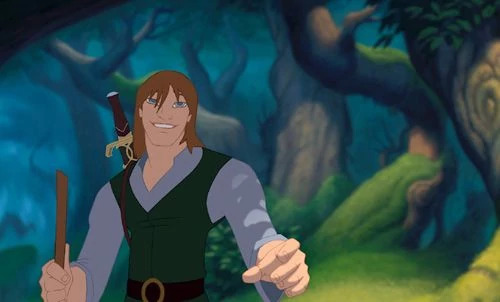
There’s a Good Times animated version of The Little Mermaid where though The Mermaid gets the prince, she never does get her voice back and... I’m perfectly okay with that. So what if she’s mute? She was happy. She had her prince and she finally got to be human, what she always wanted anyway. And she didn’t need her voice to triumph anyway.

But no, Elisa never does gain a voice by the end of the movie. And no, it does NOT confirm that she was “never human be to begin with.” I hate that “Interpretation.” Again, see the quote a previously posted. That quote establishes that The Creature is a river God and there really are no others like him. He does not represent some lost race and she was not of that race. She’s his soulmate. It’s as simple as that. He gave her gills so she could come with him into the water. But he didn’t think she needed a voice and neither did she. As I said before, the fantasy sequence was not even really about her wanting a voice, but wanting to express how much she loved him. That is all. That’s why the song used in the scene is “You’ll never know.”

3. This is tied to the ableist nonsenses. People have ACTUALLY complained about Elisa spelling out F-U-C-K you instead of just giving the sign for “Fuck.”
Now, I’m not completely fluent in American sign language (ASL), I only know a little bit but it’s my understanding that there are at least four gestures that mean “Fuck” or similar and at least one for “asshole.” And people are actually complaining that she didn’t use the common sign for “fuck.” Here’s the thing, folks. Sometimes we deliberately want to stretch out what we’re saying, to savor the moment, and sometimes we deliberately spell our words out instead of just saying the word. Or sometimes we avoid swears by spelling them out instead of saying them. Sometimes it makes the word more potent if it’s spelt. If you can’t annunciate stretching out the word, spelling can work to compensate. Like writing “Oooooh” to indicate a gradual realization instead of “Oh.”
We (those of us with normal functional vocal cords) sometimes do the spelling out thing. (“Stevie and Bucky sitting in a tree. K-I-S-S-I-N-G.”) so why is it suddenly wrong if a mute girl does that too? Isn’t it actually ableist to presume she wouldn’t / couldn’t express herself that way?

4. There are some people complaining that the film should have used an actual mute woman in the role and that there are plenty of disabled actors out there who need the work. There are a few people saying that Sally Hawkins having the role of Elisa is “offensive” and “Ableist.”
Yes, there are disabled actors who need the work but in the case of Elisa, an actress is needed who fit the physical body type that was desired by Guillermo del toro, and you would add on that she would have to be mute but not deaf, and could swim / had no aversion to water. And also had no modern accoutrements to accommodate for the muteness, and was fluent in American Sign language specifically, and could be extremely expressive in their acting as well as learning complex dance moves. It’s not impossible but it would have been very difficult.
I’m not saying a real mute person can’t do the role. I’m just saying that such a role could be difficult for anyone.
As I am possibly ill-suited to judge, I have consulted with verbal and hearing impaired friends that I grew up with on Long Island, and none of them were offended by Elisa. In fact most of them love the character.
With the online complaints that they should have used a mute actress, I saw similar complaints about Angelique in the TV show Penny Dreadful, how she should have been played by an actual Trans woman.
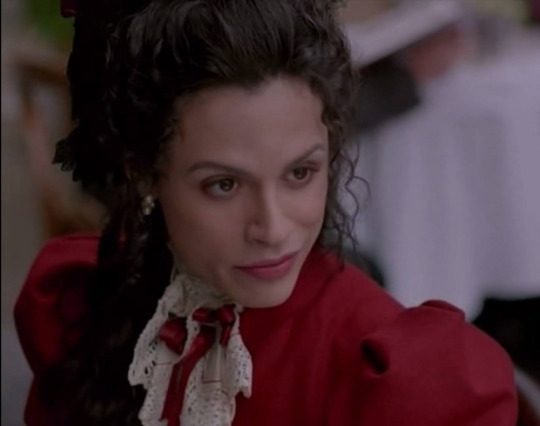
Normally I would see nothing wrong with wanting that but Angelique was a Trans woman in the late nineteenth century- a time when there were no Transition surgeries, no hormone treatments, and there was going to be at least one scene of Angelique not presenting herself as female. This could be traumatic for a Trans actress and requires some specifics that might be seen as troubling, difficult, or impossible for many real Trans actresses. No, not impossible, but definitely difficult if you want realism for someone of that time period trying to present themselves as the gender their soul is but not their physical body. I’m not saying a real Trans woman can’t do it, but it might be very difficult for her and praise for any Trans woman who would take on that type of role.
And here’s a very real question. If we only cast real mute people, or real gay people, or real (insert minority thing here) how long until it’s no longer acting? Yes, gay, disabled, ect, actors of minority backgrounds should be cast for the roles that fit them when they are available but you would be surprised how often they don’t actually come to casting calls. I was made aware once of a play that featured a blind character and literally only one blind actress showed up for the casting and she wasn’t very good at acting either, no matter how much they tried to coach her and she refused to learn the lines. She felt she deserved the role simply for being blind, and didn’t care about the actual acting part.
If we are strict and specific in casting where do we draw the line? Do we stop letting people dye their hair for roles? Do we insist short actors can’t take tall roles anymore? Do we require blue eyes when blue contact lenses are readily available? Do we tell women like Wao Yoka (a popular Japanese theatre actress) that she can’t play male roles because there are plenty of male actors who want the part?
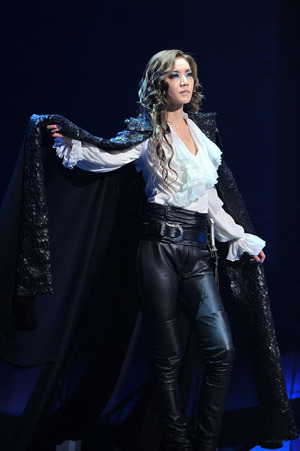
Where do we draw the line? I know that despite my poor eyesight I’m not offended by Charlie Cox as Daredevil.

Yes, I would like to see more actual disabled actors in Hollywood but it’s not that people refuse to cast them. It’s just that not as many people with disabilities make the effort to take the big roles as you may think. If you don’t believe me, check out any open casting for a disabled character role and look how few actual disabled people show up at the audition.
Also we tend to take for granted when celebrities shine that do have disabilities. And often no one thinks of them as disabled. Look at David Bowie for example. David Bowie had no depth perception due to damage in his left eye. When he was in a production of The Elephant Man they pushed back the sets because he stumbled off the stage. For yearsm before David Bowie died, he had a book of his own song lyrics with him whenever he performed and the lyrics were all in large print.

It’s actually good thing that there are quite a few disabled people in Entertainment that no one considers disabled. William Shatner has Tinnitus, Stephen King has deteriorating eyesight, Michael J. Fox has Parkinson’s Disease, Millie Bobby Brown is deaf in one ear, Lou Ferrigno is hearing impaired. And most of these actors (and writers) play or write characters who don’t even have the disabilities they have. Their disabilities don’t define them.

If we create an obligation that characters like Elisa have to be played by a disabled person then what? Do we stop letting Millie Bobby Brown from playing characters who use both ears? Do we stop letting gay men play straight characters? Do we forbid Trans women from playing cis women? Where do we draw the line? Isn’t the whole point of acting to become something you really aren’t? To transcend from yourself into new experiences and identities outside of what you know in your day to day life?
Note: I do not think of being gay as a disability. Nor do I think of being Trans as a disability. I only bring up Gay and Trans roles because I have seen that argument before about Gay and Trans characters and how they should only be played by real Gay people and or real Trans people.
Yes, I agree that more actual disabled, actual Trans, actual minorities of various types, should be cast in Hollywood, but it’s also okay when those cast are not playing roles specific to their “Minority status.” If a disabled person plays someone who doesn’t have their real world disability- great. If a Trans woman plays a Cis woman- great. If a gay man plays a straight role- fine. And I don’t think people like Sally Hawkins should be penalized because she’s not really mute. That’s not fair. All roles should potentially be open to anyone. Perhaps it’s not popular to think this way, but I do.
5. It’s when beautiful films The Shape of Water are discredited as Abelist that Hollywood gets discouraged and stops trying to represent characters like Elisa in Hollywood and frankly I think we need MORE characters like Elisa in Hollywood. She’s not just a strong disabled character. She’s not just a strong woman character. She’s a strong character, period.
Elisa is clever. She’s cunning. She is brave. She is warm. She is caring. She is compassionate. She’s kind. That’s important. She’s kind. You don’t see that too often with Hollywood’s idea of “strong” female characters anymore. They tend to treat kindness like a weakness. Elisa is kind. She is beautiful in her very soul. She is open minded. She does not judge by appearances. She isn’t a bigot. She likes eggs. She hates Key Lime Pie. She has a fondness for old musicals. She does not like to be ignored but is patient for her friends. She does not abide injustice if she can help it. She’s not afraid to speak her mind. She’s poor, working class, but not at all stupid or complacent with her place in the scheme of things. She’s an orphan. She has no family. She’s not afraid of her own sexuality. She has the heart of a secret agent and the tenacity to fool the world. She’s such a great person that she wins the admiration, respect, and love of a God, a God that SHE rescues. She’s more well developed than most Hollywood protagonists today.

Also Elisa’s actress, Sally Hawkins, is nearly forty-two-years-old. Hollywood still has that sexist / agist stigma that most female protagonists (particularly in love stories) have to be in their late teens or early twenties. This character broke a LOT of barriers and should be celebrated not scrutinized and criticized.
______________________
Conclusion:
Honestly, most of this defense of The Shape of Water should have been common sense. The Shape of Water is a gorgeous movie and very respectful to people with disabilities. There was nothing wrong with Elisa. Her true love just happens to be an aquatic God who didn’t know human languages.
And again, just because he got captured and doesn’t look human doesn’t mean he’s not a God.
Ever read Neil Gaiman’s Sandman?

The first issue of Sandman: Prelude and Nocturns features Morpheus (the ruler the dream realm) trapped in a giant glass bubble in a magical binding circle. He was kept naked and held prisoner that way, dehumanized, for seventy years in the basement of an occult organization’s main house. And he doesn’t speak during his entire captivity either.

He was the prisoner of the group that summoned and trapped him. And he looked like an emaciated, naked, alien, with chalk-white skin, wild-dark hair, and sold black eyes. In short, he looks humanoid but not precisely human, much like The Creature in The Shape of Water.
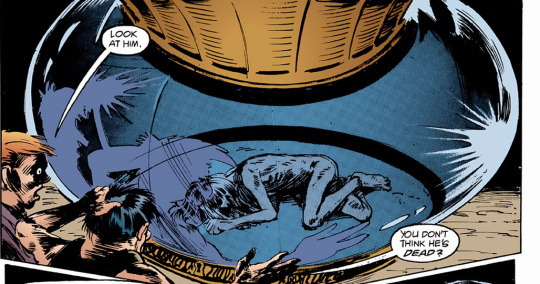
Sometimes deities don’t look the way we expect and it’s human arrogance that makes us not realize their true power. Isn’t that also what happened to Jesus in Christian lore? That he wasn’t recognized for who and what he truly was because of his humble appearance?
The Shape of Water has the same lesson we’re supposed to learn with Beauty and The Beast. Don’t be deceived by appearances. And yet I think many did judge and made assumptions by appearances in regard to The Shape of Water . And that is both ironic and tragic.
In the case of The Shape of Water, I urge you to watch the movie for yourself. It’s a gorgeous film. It deserves the praise. And don’t judge it because you saw some pretentious and self-righteous blog post bashing it based on misinterpretation or hearsay. That is all.
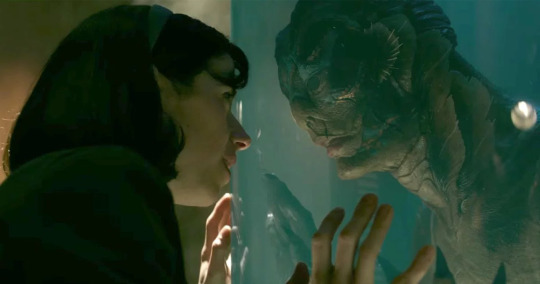
#Shape of Water#The Shape of Water#Sally Hawkins#Elisa#Eliza#Elisa Esposito#Eliza Esposito#Guillermo del Toro
24 notes
·
View notes
Text
22 November
Reading session with Old Schmedling.
Reading: Mehti, Hilde(2018)“Paying attention to material responses in local ecologies” n Material PerceptionsDocuments of Contemporary Craft Ed. André Gali pp. 157-177
Produced text:
In Praise of Redundancy - Andrea Galiazzo
You certainly happened to overhear a private conversation or you had to endure an horrible song played out loud by someone on the street or on public transports. As human beings, we are not able to control with accuracy the range of our voice, nor we can ear away or shut our ears like we do with our eyes, unless we cover them with our hands.
Any intentionally produced sound, whether it is verbal communication or an artistic expression, exceeds its intended scope; it propagates further from its target area, potentially reaching fortuitous receivers. Whispering in somebody’s ear or using specific devices such as headphones, can be considered exceptions that confirm the rule.
When wisely used, the excess - or redundancy - of sound can be instrumental in disseminating information, ideas, stories and narratives. Moreover, it creates the favourable conditions, if not a good alibi, for any attempt to infiltrate, circumvent, reenact or reformulate the limitations and regulations of a given context. Itinerant minstrels, preachers, Agitprop, or Theatre of the Oppressed are examples of a wise use of this residual potentiality.
In which way this could be relevant today, here and now? I suppose the only way to find out is to try it out, going into it. I suppose I shouldn’t suppose in the first place, and just try this out. AArgh! I made another assumption! Shut up Andrea!!! Wait, what if that was not an assumption but rather intuition?
What follows is a sample for an hypothetical contemporary Agitprop. Ideally it should be heterogeneous without being generalist, non-normative without being ostentatious, ideological without being rigid, simple and complex as well as fast and slow at the same time. Deliberately including information, thoughts, stories, art and poetry.
How am I today: I am tired and busy but I am quite happy.
A poem a day: A poem per day/ keeps the doctor away/ still takes you to the grave
An anecdote: Last year I went to a party where I met by chance a former schoolmate I hadn’t seen for ten years. He happened to be in Oslo for a few days. It was nice to have a chat with him.
A book: You are about to begin reading Italo Calvino's new novel, If on a winter's night a traveler. Relax. Concentrate. Dispel every other thought. Let the world around you fade. Best to close the door; the TV is always on in the next room. Tell the others right away, "No, I don't want to watch TV!" Raise your voice—they won't hear you otherwise—"I'm reading! I don't want to be disturbed!" Maybe they haven't heard you, with all that racket; speak louder, yell: "I'm beginning to read Italo Calvino's new novel!" Or if you prefer, don't say anything; just hope they'll leave you alone.
Find the most comfortable position: seated, stretched out, curled up, or lying flat. Flat on your back, on your side, on your stomach. In an easy chair, on the sofa, in the rocker, the deck chair, on the hassock. In the hammock, if you have a hammock. On top of your bed, of course, or in the bed. You can even stand on your hands, head down, in the yoga position. With the book upside down, naturally. (Opening sentences from “If on a winter's night a traveler” by Italo Calvino, 1979)
What I ate yesterday: spaghetti with tomato and eggplant sauce, green beans and fried chicken, dark chocolate, Côtes du Rhône
It happened 100 years ago: November the 22nd, 1918. The Belgian royal family returned to Brussels after the war, with King Albert I of Belgium having commanded the Allied army group in the autumn Courtrai offensive which liberated his country. Violence against Jews in the city of Lwów, Galicia intensified as some 500 businesses, homes, and synagogues were looted, vandalized and burned. Polish commanding officer Czesław Mączyński of the Second Polish Republic ordered martial law on the city by the end of the day, although many sources alleged he intentionally delayed it for a day while the violence happened. French forces occupied the former German-held region of Alsace-Lorraine. The German National People's Party was established. The American Japan Glass Sheet Company was established in Osaka. (Source: Wikipedia)
Spot commercial: this spot is available for your company, please contact the artist
A quote: Mostly, I believe an artist doesn’t create something, but is there to sort through, to show, to point out what already exists, to put it into form and sometimes
reformulate it. That’s the spirit in which I gathered all the press clippings and photos of women, their postures, their gestures - their hands stirring sauce or putting on a bandage. It’s a language in itself, which is why we don’t pay any attention to it. I didn’t invent anything, I indicated.... (from “Word for Word”, Annette Messager, 2006)
Weather report: Cold, partly cloudy
A dance move: ....
A speech: Dear friend and colleagues, I am very honoured to be part of this group. Thank you.
A question: Is it possible, as an artist, to reach out a non-specialised public, without flattening the complexity needed to maintain an intellectual and engaged
dialogue with a specialised public? Or in other words: Is it possible to produce multiple levels of interpretation or multiple modes of agency while at the same time preserving a sharp, relevant and communicable position?
A grimace: ....
A material: Tyvek® brand protective material is a family of tough, durable spunbonded olefin sheet products that are stronger than paper and more cost- effective and versatile than fabrics. Made from high density polyethylene fibers, Spunbonded Olefin is an extremely versatile material, offering a balance of physical characteristics that combine the best properties of paper, film and cloth.(Source: Product Handbook for DuPontTM Tyvek, www.dupont.com)
Observing a stranger:....
A headline:.....
A piece of music: Yesterday, all my troubles seemed so far away.... The time: ....
A guest:...who is next?
0 notes